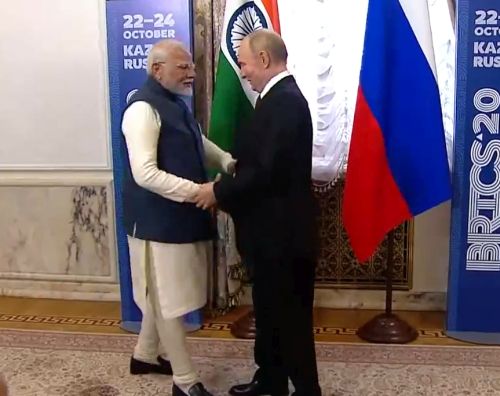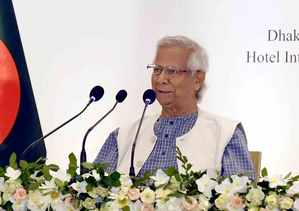International
IANS Analysis: Understanding the Balochistan conundrum, a tale of brutal repression by Pakistan
New Delhi, July 3 (IANS) Balochistan, a region of significant geopolitical importance, has been entangled in a complex and long conflict.
Under the stringent control of a military regime led by Pakistan and its intelligence services, the inhabitants of Balochistan are suffering immensely.
Forced disappearances and extrajudicial killings carried out by an authoritarian regime have severely impacted the Baloch community.
Historical Context
The current situation in Balochistan has a historical context. Balochistan, the largest province of Pakistan by land area, is endowed with abundant natural resources but remains one of the most underdeveloped regions in the country.
The origins of the ongoing conflict date back to the partition of India in 1947 when Baloch leaders sought independence.
However, the region was forcefully annexed by Pakistan in 1948, leading to widespread resentment and the rise of nationalist movements. Over the last seven-and-a-half decades, Balochistan has witnessed several insurgencies, each driven by demands for greater autonomy, control over local resources, and recognition of Baloch identity.
Pakistan as a state has predominantly responded militarily. Its handling of Baloch affairs has been marked by brutal repression to suppress any kind of dissent. This approach has created an atmosphere of perpetual tension and mistrust between the Baloch populace and the federal government.
Role of the military and intelligence agencies
The Pakistani military and intelligence agencies play a central role in this conflict in Balochistan. The area is heavily militarised, with a strong presence of the army and paramilitary forces.
These forces are accused of severe human rights violations, including forced disappearances, extrajudicial killings, and torture.
Forced disappearances have notably become a primary tactic in the state’s effort to suppress Baloch nationalism.
Individuals such as activists, students, and ordinary citizens suspected of separatist leanings are often abducted in utter disregard to laws and human rights. Human rights organisations estimate that thousands of Baloch have been subjected to these enforced disappearances, fostering a climate of fear and uncertainty.
The Human Rights Commission of Pakistan documented more than 1,000 cases of such disappearances in Balochistan from 2014 to 2018. Bodies of missing Baloch people are often found dumped in remote areas of Pakistan with visible signs of torture and trauma.
Such instances of extrajudicial killings are severe human rights violations, carried out to intimidate and silence dissent within the Baloch community.
Despite repeated condemnations from global human rights organisations, these practices continue unabated in Balochistan.
The abundance of natural resources in Balochistan such as natural gas, minerals, and fisheries should have brought prosperity here. However, the reality is vastly different.
The province remains impoverished, with limited access to essential services like healthcare, education, and clean water.
This economic marginalisation has fueled grievances among the Baloch, who can see that their resources are being exploited for the benefit of other regions and the Central government.
There is hardly any reinvestment for their development.
The construction of the Gwadar Port, a key project under the China-Pakistan Economic Corridor (CPEC), aptly explains the paradox of development in Balochistan.
Although promoted as a transformative initiative for the regional economy, the project has largely excluded local participation and benefits.
Land acquisition for the port and associated infrastructure has displaced thousands of Baloch families, strengthening their sense of disenfranchisement.
Reports indicate that local fishermen, who relied on Gwadar’s coastal waters for generations, have been severely impacted by restrictions on fishing activities and the environmental degradation due to the port’s construction.
Humanitarian crisis
The human cost of the conflict in Balochistan is immense. The unending cycle of violence, enforced disappearances, and killings has devastated numerous families and communities.
Women and children, in particular, suffer greatly, bearing the loss of loved ones and living in constant fear of violence.
Humanitarian organisations face significant challenges operating in Balochistan due to state-imposed censorship and safety concerns.
International attention to the crisis has been sporadic, and efforts to address human rights abuses have largely been ineffective.
Political landscape
Balochistan’s political landscape is marked by a fragmented and diverse array of actors, including nationalist parties, armed groups, and tribal leaders.
Some factions advocate for complete independence from Pakistan, while others seek greater autonomy within the federal framework.
Efforts to achieve a political solution have been hindered by deep-seated mistrust and the state’s reluctance to engage in meaningful dialogue with stakeholders.
Sporadic attempts at reconciliation such as amnesty programmes for armed freedom fighters and promises of development projects have failed to address the core issues driving the conflict.
The Baloch leadership remains sceptical of the Pakistan government’s intentions, viewing such initiatives as superficial and insincere.
Data from the South Asia Terrorism Portal indicates that more than 2,000 people died in insurgency-related violence in Balochistan between 2010 and 2020, underscoring the persistent nature of the conflict.
The international dimension
Balochistan’s strategic importance and rich natural resources have garnered international attention, adding layers of complexity to the conflict.
Pakistan’s partnership with China, especially through the CPEC, highlights the global stakes in the region.
The international community’s response to the Balochistan issue has been inconsistent.
Although some human rights organisations and foreign governments have condemned the abuses, there has been limited action to put pressure on the Pakistan government to address the situation.
Geopolitical interests often overshadow human rights concerns, leaving the Baloch people with limited options on the global stage.
The conflict in Balochistan has been aggravated by the oppressive actions of Pakistan’s military and intelligence agencies.
Their all-pervasive influence along with deliberate economic marginalisation and political fragmentation of the Baloch, has created a highly volatile situation inflicting grave suffering on the Baloch people.
Addressing this crisis requires a steadfast commitment to genuine dialogue, protection of human rights, and the implementation of development policies that prioritise the needs and aspirations of the Baloch population.
But the attitude of Pakistan’s establishment doesn’t inspire any hope.
–IANS
scor/
International
Lee Hsien Yang seeks refuge in United Kingdom

Lee Hsien Yang, the youngest son of Singapore’s founding father, the late Lee Kuan Yew, announced on Tuesday that he is now a political refugee in the United Kingdom after seeking asylum from the British government “as a last resort.”
“I remain a Singapore citizen and hope that someday it will be safe to return home,” Lee stated in a Facebook post, as reported by Channel News Asia (CNA).
Citing what he described as the Singapore government’s “attacks” against him, Lee, who is the younger brother of former Prime Minister Lee Hsien Loong, revealed that he sought asylum protection in 2022.
Lee Hsien Yang and his late sister, Lee Wei Ling, who passed away earlier this month, have been in conflict with their brother Lee Hsien Loong over the fate of their father’s home following his death in 2015, resulting in a public dispute that has estranged the siblings.
In an interview with the UK-based newspaper The Guardian, Lee alleged that a “campaign of persecution” compelled him to seek asylum in Britain.
In response to his claims, the Singapore government stated that there is “no basis” for his allegations of “a campaign of persecution” or other assertions regarding political repression in the country.
“Singapore’s judiciary is impartial and makes decisions independently. This is why Singaporeans have a high level of trust in the judiciary,” a government spokesperson remarked.
The spokesperson added that there are no legal restrictions preventing Lee and his wife, lawyer Lee Suet Fern, from returning to Singapore. “They are and have always been free to return to Singapore,” the spokesperson said.
Lee and his wife have been outside of Singapore since 2022, having opted not to attend a scheduled police interview regarding potential offenses related to providing false evidence in judicial proceedings concerning their father’s will and the family home.
Lee and his late sister, who had been living at the property, alleged they felt threatened while trying to fulfill their father’s wish to demolish the house. They also accused their elder brother, former Prime Minister Lee Hsien Loong, of abusing his governmental influence to advance his personal agenda.
International
Indo-Russian ties are stronger than ever before at BRICS

Kazan, Russia: Prime Minister Narendra Modi held a bilateral meeting with Russian President Vladimir Putin on the sidelines of the 16th BRICS Summit.
During the meeting, President Putin remarked, “I recall our meeting in July, where we had productive discussions on various issues. We’ve also spoken over the phone several times. I am very grateful you accepted the invitation to come to Kazan. Today, we will attend the BRICS Summit’s opening ceremony, followed by dinner.”
PM Modi responded by expressing his appreciation, saying, “I sincerely thank you for your friendship, warm welcome, and hospitality. It’s a great pleasure to visit such a beautiful city as Kazan for the BRICS Summit. India shares deep historical ties with this city, and the opening of our new embassy here will further strengthen these connections.”
International
Laos seeks to enhance nutrition amid climate change concerns

Vientiane (Laos), Aug 22 (IANS) Representatives from the Lao government and development partners have attended a conference here titled “Climate Change and Nutrition in Laos: Intersections and Interventions” to discuss the impact of climate change on nutrition in the Southeast Asia country and potential solutions.
Speaking at the conference, deputy director general of the Department of Hygiene and Health Promotion under the Lao Ministry of Health Viengkhan Phixay, said, “We gather to address a critical and interwoven issue: the impact of climate change on nutrition and how we can work together to tackle these challenges,” Xinhua news agency reported.
The Lao government is actively engaged in this endeavor, with numerous policies and initiatives aimed at addressing both climate change and nutrition, Lao National Television reported on Thursday.
“By leveraging the Scaling Up Nutrition network in Laos, which is led by the government, and supported by civil society, donors, and the United Nations, we have a robust platform to tackle the negative impacts of climate change while improving nutrition and overall health for everyone in Laos,” Viengkham said at the conference held on Monday.
The conference featured a series of presentations that not only detailed evidence-based research but also introduced innovative tools for measuring and enhancing nutrition under the impact of climate change.
The conference stressed the critical need for integrated approaches to tackle the intertwined challenges of climate change and nutrition, and setting the stage for impactful future collaborations.
–IANS
int/psd
International
One killed, seven injured in shootout in Iraq

Baghdad, Aug 22 (IANS) A civilian was killed while seven others were injured on Thursday in a tribal shootout in Iraq’s holy Shiite province of Najaf, according to a local security source.
The shootout erupted in the early hours between armed men from the local tribe in the al-Zarga area in northern Najaf, some 160 km south of Baghdad, a local police officer told Xinhua on condition of anonymity.
The clash resulted in the killing of an Iraqi civilian and the injury of seven others, including three Iranian Shiite pilgrims, the source added.
A joint force from the Interior Ministry’s emergency response division and Najaf provincial police arrested 53 gunmen from both sides of the shootout and seized weapons and ammunition, the Interior Ministry said in a statement.
It added that search operations are ongoing to locate additional gunmen and weapons, with more details to be released later.
The incident took place as numerous pilgrims traveled to the city of Karbala to observe Arbaeen, which marks the end of a 40-day mourning period for the killing of Imam Hussein, the grandson of Prophet Muhammad, in the Battle of Karbala in 680 A.D.
Typically, these pilgrims also visit Najaf as part of their journey to Karbala.
–IANS
int/jk/arm
International
Bangladesh seeks $1 billion budget support from World Bank

Dhaka, Aug 22 (IANS) Bangladesh’s interim government has sought $1 billion from the World Bank as budgetary support.
The call came from the country’s Power, Energy and Mineral Resources Adviser Muhammad Fouzul Kabir Khan’s meeting with Abdoulaye Seck, the World Bank’s Country Director for Bangladesh and Bhutan, in Dhaka on Wednesday.
He made the plea as the ministry owes more than 2 billion dollars to suppliers in import costs of power and energy, Xinhua news agency reported.
Khan mentioned that the interim government, which was formed with many pressing mandates, is due to settle a $2 billion debt left by the previous government in the power sector.
He said they have already suspended activities under the much-criticized Quick Enhancement of Electricity and Energy Supply Act 2010 and abolished the government’s power to set energy prices without any public hearing.
On August 5, the former Prime Minister of Bangladesh, Sheikh Hasina, was ousted from her country and power, ending her rule since January 2009.
This event was seen as a massive escalation, with what initially started as student’s protests and resulted in a major crisis in Bangladesh.
Earlier on August 8, Nobel laureate Muhammad Yunus took oath as the head of Bangladesh’s interim government.
–IANS
int/jk/as
-
Video2 years ago
PM Modi Attacks Congress in Karnataka with “Kerala Story”
-
Politics2 years ago
Siddaramaiah & DK Shivakumar sworn in as Chief Minister & Deputy CM respectively
-
Cricket2 years ago
CSK players rejoice 5th IPL title with their families (Pics)
-
Entertainment2 years ago
Karan Deol weds his longtime Girlfriend Drisha Acharya (Pics)
-
Sports7 years ago
History Of Official FIFA WORLD CUP Match balls
-
India2 years ago
Ashwini Vaishnaw: Railway Board recommends CBI probe in the Odisha railway disaster
-
Entertainment2 years ago
Urvashi Rautela dazzles on Cannes 2023 red carpet (Pics)
-
Entertainment2 years ago
Sunny Leone gets ready for Kennedy premiere in Cannes (Pics)





























